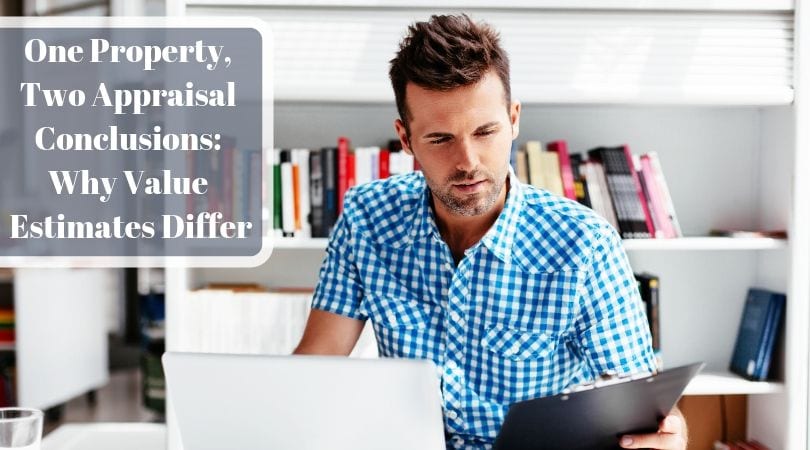One Property, Two Appraisal Conclusions: Why Value Estimates Differ
Categories: Commercial Appraisals, Real Estate Appraisal
Appraisals of the same property by different appraisers are rarely the same. Differing value opinions are usually a result of various factors. When an appraisal user encounters contrasting value conclusions for one property, they can decide— by considering several variables — which conclusion is most reliable.
Opinion Versus Fact
By definition, an appraisal is an opinion of value, not fact. While a property’s sale price and construction cost are provable quantities, its value is an opinion of desirability to defined groups. So, appraisal conclusions, even though supported by facts, can vary among appraisers. Appraisers’ knowledge and experience often account for factual and analytical differences between value estimates.
Factual Disparities
Value opinions will be contradictory if appraisers describe a subject property differently. If two appraisers disagree on a property’s size, age, or physical components, their conclusions will be different. If appraisals’ dates of value are not identical, value conclusions may also vary. Date variations are especially common in appraisals for taxation purposes: usually, taxing authorities express value as of a specific past date, while property owners’ appraisals may be as of a current date.
Appraisers identify the type of value they are researching. While market value is most often the focus of appraisal assignments, appraisers also study other kinds of value, such as use, investment, assessment, and insurable values. Uniform Standards of Professional Appraisal Practice require appraisers to identify the definition of market value assumed in an appraisal: different definition elements, such as marketing time (or best versus most probable price) will affect value conclusions.
Different factual considerations for comparable sales can also change value conclusions. Both the sale properties’ physical descriptions and the conditions of their purchase will impact their unit sale prices. If a sale property is smaller than reported, its unit price will likely be higher. If the property is sold under duress, its unit price will probably be lower.
Analysis Variations
The analysis applied in an appraisal will affect its result. Divergent scopes of work can affect appraisals’ detail and depth of analysis. When appraisers conclude different highest and best uses for the same property, value conclusions likely will vary.
How an appraiser analyzes a property’s market will affect their selection of comparable sales. For example, if an appraiser knows that single-level homes are most desirable in a market area, excluding comparable sales of two-level homes will result in a different range of value. If the subject property is unusual in its locality, an appraiser may extend the comparable sale search outside of that region.
When an appraiser has extensive experience appraising in a specific location or for a particular property type, their analysis will often be different from that of a less-experienced appraiser. The experienced appraiser may place more weight on locational differences or property features. They may even have useful data from previous appraisals, such as proof for comparable sale adjustments.
Addressing Appraisal Differences
Appraisal conclusions often vary because they are opinions, not facts. By comparing both the facts and the analysis underlying different value opinions, an appraisal user can determine which opinion is most relevant. When value opinions for a property conflict, one opinion isn’t necessarily wrong. However, one appraisal will perhaps be best suited to the intended use at hand.






You made a good point when you shared that it is best to choose an experienced appraiser who may place more weight on locational differences or property features. My uncle just mentioned the other day that he is planning to buy a new house but he needs to sell his old home first so he can get the downpayment to pay for it. I will suggest to him looking for a reliable and experienced real estate appraiser who can help him decide on the right price.
It’s great that you talked about real estate appraisals and how they could give different results for the same property. Recently, my wife and I decided we’d like to sell our house and buy another one closer to the lake. We’d like to know about our house’s value, so we’ll be sure to look for professional help. Thanks for the advice on properties and how an appraisal evaluates one.